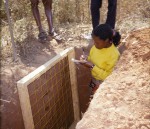The Kellogg Biological Station (KBS) Long-term Ecological Research (LTER) program of Michigan State University (MSU) is partnering with the University of Malawi in southern Africa in a project that aims to understand land use impacts on soil carbon sequestration and implications for food security in one of the most understudied biomes in the world: tropical agroecosystems.
Titled ‘Soil carbon distribution and dynamics in Malawi: A unique opportunity to optimize sustainable land use and enhance food security,’ the project is a team effort involving Malawi- and U.S.-based scientists working closely together, including Dr. Sieg Snapp and Mr. Placid Mpektula. Mpektula, a lecturer in Biology at the University of Malawi, is pursuing a PhD with Dr. Snapp, a MSU professor of crop and soil ecology based at KBS. As an LTER co-principal investigator, Snapp’s dream is to bring insights from LTER’s long-term ecological approach to answer difficult questions about how land is used to produce food in tropical agroecosystems, in collaboration with students, farmers and researchers in Malawi. This dream became a reality recently, thanks to a new funding program operated by the National Science Foundation and the United States Agency for International Development called the Partnerships for Enhanced Engagement in Research (PEER). PEER provides scientists in developing countries competitive grants to support research and capacity-building activities, and in its highly competitive first round, the proram received nearly 500 applications. The KBS LTER-Malawi joint project was one of the 41 successful applicants.
“Soil carbon is important in agriculture because it is central to soil fertility, water relations and plant growth,” Snapp explains . “As a part of this project, we will investigate soil carbon distribution and its dynamics on limited-resource farms across Malawi.”
Long-term research at KBS has highlighted the role that soil carbon plays in building sustainable agricultural systems that can help ensure food security in developing countries. Snapp has worked in Malawi for 20 years, through multidisciplinary research and experiential learning techniques that integrate local approaches, along with developing knowledge for policy makers and agricultural development leaders.
“The economy of Malawi hinges on agriculture, which makes the question of land productivity a crucial one,” explains Mpeketula. ‘It is exciting to have the opportunity to investigate soil carbon dynamics, and contribute to a more secure future for small-scale farmers in Malawi.’
The results of the project will be particularly useful to farmers, land use planners and policymakers who depend on land use strategy options that can enhance soil quality and agricultural production. The project not only benefits the population of Malawi, but potentially other developing countries. MSU has a long history of working in Africa, and the new PEER project is expected to build on this partnership to expand the lessons from KBS LTER to support international agroecosystem research. With opportunities for cross-site learning in both the United States and Africa, the partnership is essential in unraveling new research insights and in gaining a better understanding of long-term processes that influence agricultural productivity.

 Enlarge this image
Enlarge this image